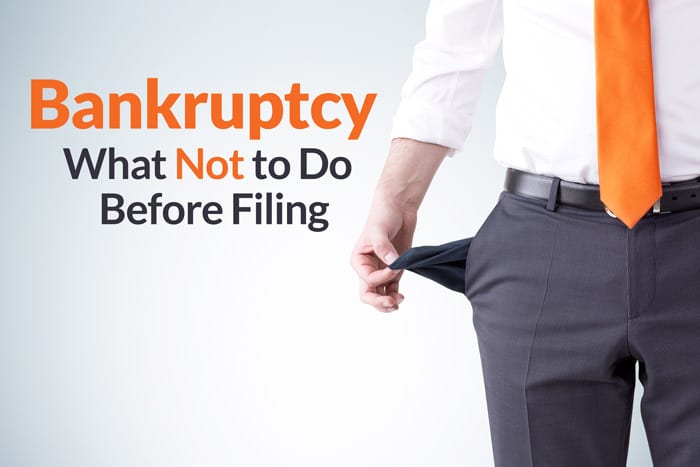What Not To Do When Filing for Bankruptcy
Home > Bankruptcy >
Bankruptcy can be a life-changing experience, but if you want it to be a positive one, there are a few mistakes you’ll need to avoid before you file.
For example, you might be tempted to hide or give away assets before filing. The bankruptcy courts consider this fraud, and if your bankruptcy trustee discovers the hidden assets, you could have your petition for bankruptcy dismissed, be charged up to $500,000 in fines and/or serve five years of jail time.
Instead of taking risks when it comes to filing for bankruptcy, follow these tips to avoid penalties and improve your chances of a positive outcome.
Common Mistakes To Avoid Before Filing for Bankruptcy
Bankruptcy can give you major relief from debt, but it’s also a complex legal process that can put your assets at risk. Here are a few common missteps to avoid if you want to ensure a positive outcome.
Lying About Your Assets
Chapter 7 bankruptcy includes a “means test,’’ in which you disclose all of your assets and income, and the court determines if you can pay off your debt.
You might be tempted to hide certain items, like cars or savings accounts, but according to Leslie H. Tayne, Esq., founder and head attorney at Tayne Law Group, you should never attempt to hide information from the court.
Why? Because during your proceedings, a bankruptcy trustee will have access to your financial records. If they find hidden assets and income, you could face several penalties. Plus, your case can be dismissed, and you can be banned from filing bankruptcy on those debts ever again.
Bottom line: Tell the truth.
» Learn More: How to File for Bankruptcy and Keep Your Car
Not Consulting an Attorney
You might be tempted to save money by not hiring a lawyer, but bankruptcy law is too complicated for most consumers to understand. Bankruptcy attorneys know the subtleties of the law, including which assets and income are exempt in your state.
“A bankruptcy attorney can ensure that you apply for the correct type of bankruptcy, file appropriately, and meet all of the court’s requirements,” Tayne said.
According to USCourts.gov, these are some of the important aspects of bankruptcy a lawyer can advise you on:
- Whether Chapter 7 or Chapter 13 is best for you, or, if you’re a candidate for Chapter 11 bankruptcy based on your income.
- Whether you’ll be able to keep your home, car, or other property.
- The tax consequences of filing.
- Whether you should continue to pay your creditors.
- When and how to properly complete and file forms.
Giving Assets (Or Payments) To Family Members
Giving assets away is a major red flag for the bankruptcy court.
You can’t give valuables—cash, electronics, vehicles, etc.—to friends or relatives for them to stash during your bankruptcy proceedings. Instead, ask your attorney about legal strategies for keeping your car after filing bankruptcy or protecting other assets you need, that way you don’t risk having your bankruptcy case denied.
Running Up Credit Card Debt
Running up your credit card bill before filing bankruptcy might seem like a good plan, but it’s likely to backfire.
If a creditor detects that you increased your balance just because you were preparing to file, they might challenge your request to have some, or all of your balance dismissed. In other words, you’ll have to pay the money back.
“You should stop using your credit cards as soon as you think you will file for bankruptcy,” Tayne advises. “For one, you don’t know for sure that all your debts will be discharged. Plus, if you rack up a bunch of charges for non-essentials within 90 days of your bankruptcy filing, it could appear as though you’re attempting to commit fraud.”
» Learn More: When to Stop Using Credit Cards Before Filing for Chapter 7 Bankruptcy
Taking on New Debt
Like credit-card use, it’s risky and irresponsible to take on new debt before filing for bankruptcy, especially when it comes to loans secured against your property, like a car loan, a mortgage or a home equity line of credit.
Borrowing money before your bankruptcy filing can jeopardize your case and, even worse, put you at risk having your property repossessed or foreclosed on.
Raiding The 401(K)
Think it’s a good idea to cash out your retirement account so you can hide money before filing for bankruptcy? Think again.
Choosing to pay off some creditors (but not others) is not allowed under the bankruptcy code. Plus, retirement accounts are exempt from being included in your bankruptcy. Whether it’s your IRA, 401(k), pension plan or otherwise, it can’t be seized by creditors or a bankruptcy trustee.
Transferring Property to Family or Friends
Putting your property in someone else’s name, or “selling” it to your spouse or a family member is a surefire way to derail your bankruptcy efforts.
Debtors are not allowed to transfer any assets for the purpose of protecting them against inclusion in bankruptcy. Instead of trying to outsmart the court, look into legal ways to protect assets and/or keep your house in a bankruptcy.
Not Doing Your Research
Not all debt is covered by bankruptcy. The types of debt that can’t be discharged include:
- Student loans
- Tax debt
- Child support
- Alimony payments
Not sure if you should file for bankruptcy based on your debt? A credit counselor from a nonprofit credit counseling agency can help you figure it out. Certified credit counselors can walk you through the pros and cons of filing for bankruptcy and show what other options you have for debt relief.
» Learn More: Can Bankruptcy Be Denied?
Timing Is Important When Filing for Bankruptcy Too
Even if you need urgent help with your debt, it’s important to consider the timing before filing for bankruptcy, since filing too soon or too late can end up costing you more down the line.
Don’t File Too Soon
Bankruptcy can help you discharge debt and get a fresh start. But you can only file for Chapter 7 bankruptcy every eight years and Chapter 13 every six years.
As counter intuitive as it may sound, that means you may want to wait and file after your financial crisis is resolved so that ALL of your debt is included.
For example, if you’re dealing with a medical emergency and you’re regularly accruing new hospital bills, you might wait until you’re in better health so you can include all of the medical debt in your bankruptcy.
Additionally, you don’t want to file before you explore your other options. If you’re not behind on debt payments and still have the resources to keep up on other bills and needs, Tayne suggests considering the alternatives first, like debt consolidation or debt settlement.
Don’t Wait Too Long
In some instances, it’s best to file for bankruptcy right away.
That’s because filing for bankruptcy is like pressing the “pause” button with creditors. Once you file, they can’t legally take any action to collect debt from you.
According to the National Consumer Law Center (NCLC), filing bankruptcy can give you any or all of the following urgently needed help:
- Stop foreclosure on your house and give you an opportunity to catch up on payments.
- Prevent repossession of your car or force a creditor to return your vehicle.
- Stop wage garnishment proceedings.
- Prevent debt collectors from contacting you.
- Stop utility companies from cutting off your service or force them to restore service.
If You’re About To Receive Substantial Assets, Reconsider Filing for Bankruptcy
If you’re expecting a windfall, you might want to hold off on filing. As tempted as you may be to file for bankruptcy before you get new cash or assets, you might end up botching the timing anyway. The court could end up uncovering some evidence during the 4-6 months it takes to complete Chapter 7, or the 3-5 years it takes for a Chapter 13 repayment.
Instead of trying to hide assets, consider using them to pay off your debt or negotiate settlements with your creditors. As an added bonus, going this route will prevent the damage that bankruptcy does to your credit scores.
What if I Make a Mistake Before Filing for Bankruptcy?
If you’ve made a mistake while filing for bankruptcy, or you just want help protecting your assets and ensuring the best outcome, contact a bankruptcy attorney right away.
If you need free or low-cost council, here are a few places to look:
- For the general public: USA.gov, LSC.gov or BankruptcyResources.org
- For veterans: VA.gov
There may also be help available for residents of your state, city, or county. “Some attorneys do work on a pro bono basis for those who demonstrate extreme need,” Tayne said. “You can check with your local Bar association or legal aid organizations for help.”
More Like This
Going into bankruptcy uninformed can lead to frustrating and even disastrous consequences. Before you file and put your credit and assets at risk, do yourself the favor of exploring your resources and learning as much as you can.
For starters, you can check out our other articles to learn more about your options for alleviating debt, like debt settlement vs bankruptcy. You can also find out what to expect from the pre-bankruptcy credit counseling you’re required to complete in order to file.
Sources:
- N.A. (ND) For Creditors. Retrieved from https://www.cacb.uscourts.gov/creditors
- N.A. (ND) Chapter 7 - Bankruptcy Basics. Retrieved from https://www.uscourts.gov/services-forms/bankruptcy/bankruptcy-basics/chapter-7-bankruptcy-basics
- N.A. (ND) Bankruptcy Information Sheet. Retrieved from https://www.justice.gov/ust/bankruptcy-information-sheet-0
- N.A. (2022, December 1) Chapter 7 Petition Package (Individual Debtors). Retrieved from https://www.cacb.uscourts.gov/sites/cacb/files/documents/forms/Ch7%20IndividualPetitionPackage.pdf
- N.A. (2022, August 24) Can a debt collector try to collect on a debt that was discharged in bankruptcy? Retrieved from https://www.consumerfinance.gov/ask-cfpb/can-a-debt-collector-try-to-collect-on-a-debt-that-was-discharged-in-bankruptcy-en-1425/
- Rao, J. (2018, September 18) Deciding Whether to File for Bankruptcy: Consumer Debt Advice from NCLC. Retrieved from https://library.nclc.org/article/deciding-whether-file-bankruptcy-consumer-debt-advice-nclc
- DeNicola, L. (2023, June 7) What Is Chapter 7 Bankruptcy? Retrieved from https://www.experian.com/blogs/ask-experian/what-is-chapter-7-bankruptcy/


